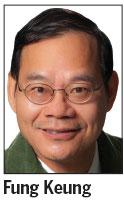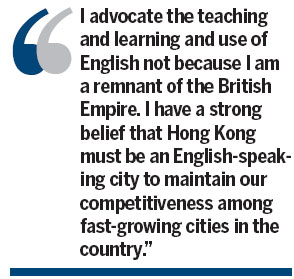Resolve key issues to remain competitive
Updated: 2013-06-28 07:40
By Fung Keung(HK Edition)
|
|||||||||
Most Hong Kong people, this humble writer included, are a happy lot since the city's handover to China from Britain in 1997. And I am sure that most people will be happier in the next 16 years under Hong Kong's "One Country, Two Systems" political framework.
Hong Kong people are happy because we enjoy press freedom, economic freedom, freedom of expression and freedom of assembly, among other freedoms; and we have access to basically all international websites and news sources, which is important for us to remain innovative and competitive.
Since the handover, Hong Kong's economy has continued to grow despite the gut-wrenching challenges posed by the SARS epidemic in 2003 and the global financial tsunami in 2008. The government's surplus has never ceased to soar and jobs have unrelentingly continued to be created.
In short, most people are happy because we can enjoy the fruits of our hard work.

Happiness and contentment notwithstanding, we must overcome some key issues should Hong Kong wish to remain competitive.
The Swiss-based IMD released a report in May 2013, which showed that Hong Kong's ranking in competitiveness has dropped to third place from its top position in 2012, overtaken by the United States and Switzerland. This could serve as a carrion call for us.
Our competitiveness fell because of sluggish economic growth, worsened social cohesion and a mediocre scientific infrastructure. I teach journalism at Hong Kong Baptist University. Nurturing young people to become future leaders is always in my thoughts.
The International Institute for Management Development report revealed that Hong Kong's innovation and education are our weak links. We ranked 30th or lower in all nine attributes related to research and development (R&D). The public spending per capita on R&D is 19 percent below the world average.
Teaching journalism is my job but my hobby is writing English-enhancement books. I always have a strong conviction that Hong Kong can remain a competitive Chinese city because Hong Kong people can speak better English than our compatriots in mainland cities.
The International Institute for Management Development report poured cold water on my head. It said that our score of 82 in the TOEFL (Test of English as a Foreign Language) puts us at the lower end among the world countries and regions (we were ranked 46th).
I have advocated the teaching and learning and use of English as I believe an English-speaking environment will attract more international companies and banks to set up shop in Hong Kong instead of Shanghai or Guangzhou, bringing us talents and coveted investments. Unfortunately, my calls have fallen on deaf ears.
Young people must learn the English language well in primary and secondary schools. A good foundation will make it easier for them to learn when young people enter universities. To allow teachers to focus on teaching, their job prospects should be secured. Sad to say, this is not the case. Only 9 out of 400 advertisements for teachers from May 2 to 11 were for permanent jobs, the Professional Teachers' Union reported recently.

If teachers don't have job security, how do we expect them to stay focused on teaching? Indeed, perhaps due to time spent on job-hunting, many teachers have no time to improve themselves. A government report released on May 26 showed that teachers' performance in this year's English written exam left a lot to be desired. Only 45 percent of the 1,300 teachers who took the exam passed the test.
Those who flunked the English test would have to resign or choose to teach another subject. If teachers' English proficiency is low, the poor performance might cascade onto many primary and high-school students. I'd urge the government to provide more job security for teachers so that they can concentrate on teaching.
Hong Kong's English-speaking environment has been a magnet for many mainland university graduates. They love to attend self-financed academic programs offered by Hong Kong's public universities, all of which invariably use English as the teaching medium. I used to run a master's program in international journalism. Every year for the 100 places offered we received at least 500 applications from mainland graduates, including some from Peking University in Beijing and Fudan University in Shanghai.
I advocate the teaching and learning and use of English not because I am a remnant of the British Empire. I have a strong belief that Hong Kong must be an English-speaking city to maintain our competitiveness among fast-growing cities in the country.
The author is coordinator of the B.S.Sc financial journalism program at Hong Kong Baptist University
(HK Edition 06/28/2013 page7)